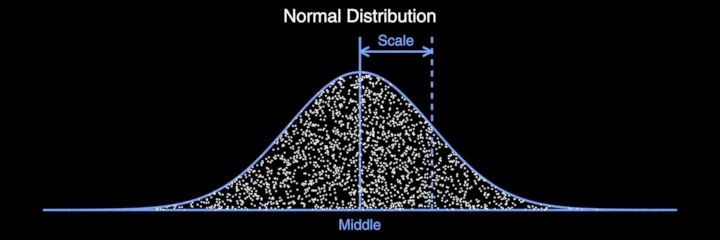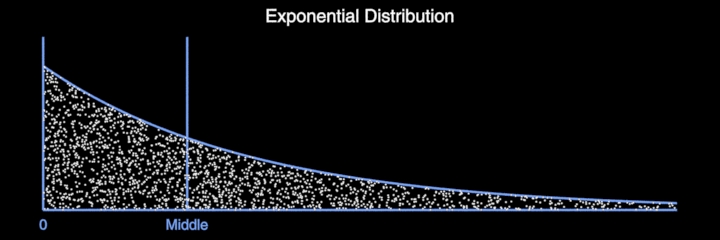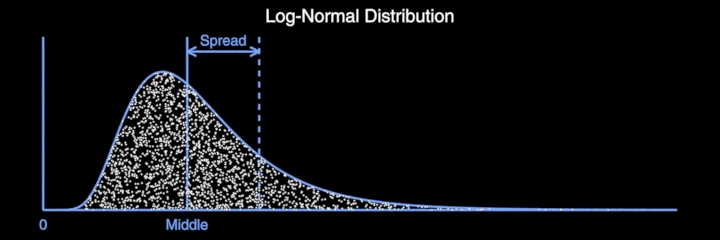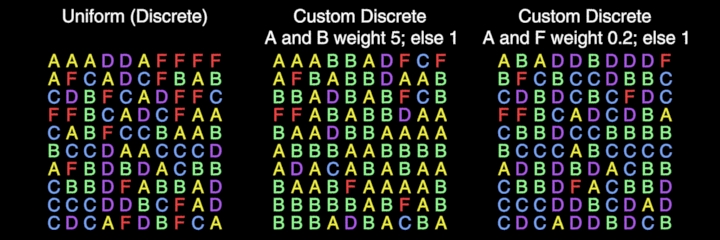| Since | 20.0 |
このノードには、ランダムな値が設定された浮動小数点/整数配列アトリビュートを作成するための方法が用意されています。
パラメータ ¶
Generate When
このノードがワークアイテムを生成するタイミングを決めます。 このノードがどの生成モードを必須にしているのか、もしくは、ワークアイテムを動的に生成させる必要があるのかどうか分からないのであれば、通常では、これを“Automatic”のままに設定してください。
All Upstream Items are Generated
このノードは、すべての入力ノードが自身のワークアイテムを生成した時にワークアイテムを生成します。
All Upstream Items are Cooked
このノードは、すべての入力ノードが自身のワークアイテムをクックした時にワークアイテムを生成します。
Each Upstream Item is Cooked
このノードは、入力ノード内のワークアイテムがクックされる度にワークアイテムを生成します。
Automatic
入力ノードの生成モードに基づいて生成モードが選択されます。 入力ノードのどれかがその入力のクック時にワークアイテムが生成されている場合、このノードには Each Upstream Item is Cooked が設定されます。 そうでない場合、 All Upstream Items are Generated が設定されます。
Create When
このパラメータを有効にすると、ワークアイテム毎に評価されるエクスプレッションを設定することができます。
以下のアトリビュートは、このパラメータのエクスプレッションがゼロ以外の値を返したワークアイテムに対してのみ作成/更新されます。
例えば、tile_xアトリビュートが5より大きいワークアイテムにのみアトリビュートを設定するには、このパラメータを有効にして、エクスプレッションに@tile_x > 5を設定します。
New Attribute Name
作成するアトリビュートの名前。
Existing Name
New Attribute Name で指定した名前のアトリビュートが既に存在した場合の挙動。
Replace Existing Attribute
既にアトリビュートが存在した場合はそのアトリビュートを置換します。
Keep Existing Attribute
古いアトリビュートが維持され、何も値は修正されません。
Update Existing Attribute
該当する既存のエレメントを上書きし、残りのエレメントを削除しません。
Append to Existing Attribute
既存配列の最後に新しくエレメントを追加します。
Prepend to Existing Attribute
既存配列の先頭に新しくエレメントを追加します。
Generate Warning on Type-mismatch
既存アトリビュートとタイプが異なる時、ノード警告を出し、そのアトリビュートを変更しません。
Generate Error on Type Mis-match
既存アトリビュートとタイプが異なる時、ノードエラーを出します。
Array Type
生成する配列のデータタイプ。
Floatに設定すると、整数分布の値がFloatアトリビュートに変換されます。
Integerに設定すると、浮動小数点分布の値が丸められ、Intアトリビュートに変換されます。
Rounding
これは、浮動小数点分布の値を整数に丸めるのに使用される方法を决めます。 これは、 Array Type がIntegerに設定されている場合に有効です。
Round Nearest
一番近い整数値に丸めます。 例: 1.7は2に、1.2は1に丸められます。値が2つの整数の完全に中間にある場合、繰り上げで丸められます。つまり、1.5は2に丸められます。
Round Up
生成された値より大きい一番近い整数値に丸めます。 例: 1.2や1.7はどちらも2に丸められます。
Round Down
生成された値より小さい一番近い整数値に丸めます。 例: 1.2や1.7はどちらも1に丸められます。
Array Size
乱数の結果の配列のサイズ。
Random Seed
乱数の生成に使用されるランダムシード。 同じ分布から異なる乱数を生成したい場合は、この値を変更してください。 シードを同じままにすれば、実行の度にこのノードは同じ値を生成することが保証されます。 同じシードで同じ設定の2つのノードは同じ値を生成します。
Random Distribution
値が生成される確率分布のタイプ。
Uniform (Continuous)
生成される値の範囲は Min Value から Max Value (それぞれ含む)になり、その範囲内のすべての値は同じ確率を持ちます。
Uniform (Discrete)
生成される値の範囲は Min Value から Max Value (それぞれ含む)になり、その値は Min value より大きい Step Size の倍数の値に落ち着き、すべての値は同じ確率を持ちます。
Two Value
生成される値は、 Probability of Value B に応じて Value A または Value B のどれかになります。
Normal (Gaussian)
生成される値は、平均値/中央値が Middle Value で指定され、標準偏差が Scale Around Middle で指定された正規分布から求められます。

Exponential
生成される値は、中央値が Middle Value で指定された指数分布から求められます。
平均値と標準偏差は中央値をln(2)で割った値に相当します。

Log-Normal
生成される値は、中央値が Middle Value で指定され、標準偏差が Spread Around Middle で指定された対数正規分布から求められます。 この分布は、ランダムなスケールを生成するのに役立ちます。その理由は、その値が必ず正の値で、ゼロに向かって次第に小さくなっていくので、スケールが小さすぎたり負の値になることを回避することができるからです。

大元の正規分布のパラメータμはln(median)です。
大元の正規分布のパラメータσはsqrt(ln(0.5*(1 + sqrt(1 + 4*(stddev*stddev)/(median*median)))))です。
Custom Discrete
指定した値は、指定したウェイト、つまり正規化されていない確率でサンプリングされます。

Minimum
生成可能な最小値。
Maximum
生成可能な最大値。
Minimum
生成可能な最小値。
Maximum
生成可能な最大値。
Step
生成可能な値間のステップ。 例えば、{4, 6, 8, 10}のどれかの値だけを生成したいのであれば、このパラメータを2に、 Minimum を4、 Maximum を10に設定します。
Value A
生成可能な1つ目の値。
Value B
生成可能な2つ目の値。
Probability of Value B
Value B が生成される確率。 Value B の発生回数を増やしたい場合、または、 Value A の発生回数を減らしたい場合、この値を増やします。
Middle Value
分布の中央値。 値が生成される確率が最も高い領域がこのパラメータ周辺になります。
Scale Around Middle
分布の標準偏差。 ランダムに生成される値の範囲を Middle Value よりもっと広げたい場合は、これを上げます。
Middle Value
分布の中央値。 生成される値の範囲をもっと広げたい場合は、これを上げます。
Middle value
分布の中央値。 生成される値の範囲をもっと広げたい場合は、これを上げます。
Spread Around Middle
分布の標準偏差。 ランダムに生成される値の範囲を Middle Value よりもっと広げたい場合は、これを上げます。
Number of Values
ランダムアトリビュートを生成する時に選択される値の数。
Value
生成可能な候補値の1つ。
Weight
選択される該当値の正規化されていない確率。 値が選択される確率を上げたい場合は、これを上げます。
Minimum Limit
有効にすると、生成された値がこの値より小さい場合、この値に設定されます。
このオプションは、 Random Distribution がNormal、Exponential、Log-Normalのどれかの場合にのみ利用可能です。
Maximum Limit
有効にすると、生成された値がこの値より大きい場合、この値に設定されます。
このオプションは、 Random Distribution がNormal、Exponential、Log-Normalのどれかの場合にのみ利用可能です。
Sorted
有効にすると、配列の内容がソート順になります。
Reversed
有効にすると、配列の内容の順が逆になります。
Log Data Statistics
有効にすると、各ワークアイテムは、生成されたデータの平均値、中央値、標準偏差のログを取ります。 生成されたデータの数値の概要が必要で、計算が少し長くなっても問題なければ、これを使用します。
| See also |